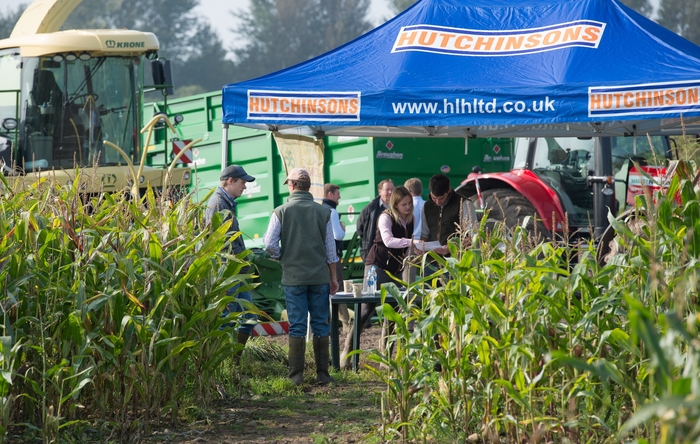Improving nitrogen availability further into the growing season is fundamental to increasing the yield potential of maize, according to trials by leading agronomy firm Hutchinsons.
Research at its northern maize trials demonstration site in Cumbria has revealed significant improvements in plant growth and cob size are possible by applying nutrition products that extend the availability of nitrogen into the summer growing season when the crop is most “hungry”.
Maize requires the majority of its nitrogen after the latest safe growth stage for travelling through the crop, with typically half of total demand between the eight leaf stage to tasseling, and another 40% required from tasseling to maturity.
But on light soils in high rainfall areas like the northwest of England, the threat from nutrient leaching often means manures and other fertilisers applied in early spring struggle to fulfil this crop requirement later in the season, Hutchinsons agronomist and trials organiser Jim Clark explains.
That is where slow-release fertilisers can have a big benefit, as highlighted by this year’s trials in Pioneer P7326 at Smalmstown Farm, near Longtown, he says.
Clear differences in cob size are visible in the four-rows by 50m plots treated at the eight leaf stage with the slow-release liquid foliar nitrogen product Efficient 28, which gives a “phased release” of nitrogen over six to eight weeks.
A similar benefit has been recorded in plots treated with the pre-emergence N-Lock nitrogen stabiliser. N-Lock inhibits the bacterial conversion of ammonium N to the more readily available nitrite, which is prone to being washed down the soil profile. This therefore retains nitrogen in the rooting zone longer where it can be taken up by plants in nitrate form.
“Maize has a huge demand for nitrogen from the eight leaf stage up to grain fill, so getting enough fertility to where it’s needed and at the right time is crucial to improving yields,” adds fellow Hutchinsons agronomist Tom Whitfield.
“Dry matter yield per hectare is key and that means sowing the right variety for your farm, feeding the crop well, and using film when establishing it in this region.”
Indeed, the trials reinforce the value of sowing maize under film in the northwest, with covered crops hitting the target 30-35% DM by early October, whereas open crops look unlikely to achieve the same maturity.
Select variety carefully
Maize is far more heavily influenced by regional conditions than wheat, so selecting the most suitable variety for local conditions is essential, Mr Clark says.
Some 20 varieties are being evaluated at the Longtown trials site, most of which are being grown under film – something that is an essential “insurance policy” given the higher rainfall and cooler climate, he notes.
Early maturity is one of the biggest factors to look for when selecting a variety in the northwest, however this must be balanced with yield, he adds.
“Historically very early varieties haven’t produced a big fresh weight yield, so growers have got to find the right balance. This is especially true when growing under film, as you need around 2-3t/acre extra fresh weight over an ‘open’ crop to recoup the cost of using film, which typically adds £85-105/acre.”
Modern varieties, such as Pioneer’s P7326 have consistently produced good fresh weight yield and met the target maturity, even in very wet seasons when other varieties have struggled to achieve the required dry matter, Mr Clark notes.
“There are several varieties from other breeders also showing a lot of promise, but we like to see consistent performance over two or three years in trials before making any decision about growing a new variety on a wider scale.”
Molasses trial
The potential benefit from applying molasses to soil prior to drilling is another area being investigated at the trial site, Hutchinsons agronomist Matthew Hyslop says.
The technique has been tried in the US, and although there was a slight visual difference in the larger size of cobs where molasses was applied to the Longtown trial, he says it is too early to say whether there is any consistent benefit to UK crops.
All crops in this season’s trials will be harvested with a specialist trials forager and fully analysed for dry matter yield and energy content and he hopes to repeat the molasses trial again next year.
“There is some debate as to exactly how molasses may help crop growth, but it could be that the sugars are stimulating soil microbiology, which helps to break down organic matter and aid nitrogen mineralisation.”
Note: The Smalmstown Farm trial site is hosted by kind permission of Mr & Mrs R Fisher.


